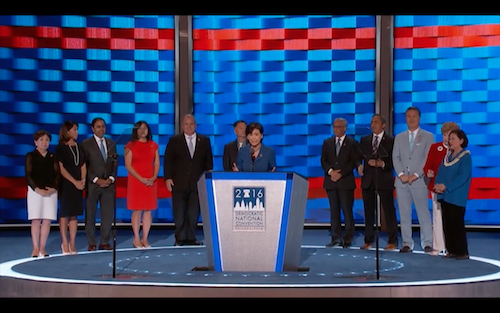Speaking together on stage for the first time at the Democratic National Convention Wednesday night, members of Congress’s AAPI Caucus came together in support of Hillary Clinton and to address the changes facing Asian Americans.
“It wasn’t too long ago that if you saw an Asian Pacific American walking in the U.S. Capitol, you had to stop and do a double-take,” Rep. Judy Chu, herself the first Chinese American woman in Congress and leading the speech, said. “But how things have changed … We have gone from being marginalized to becoming the margin of victory in key swing states and districts all across our nation.”
The Asian segment is the fastest-growing racial group in the country, estimated to make up 10 percent of voters by 2044. In 2010, there were 10 AAPI Congressional candidates. This year, there are 40.
AAPIs stand to more than double in number as voters by 2040, from 5.9 million in 2015 to 12.2 million, according to AAPIVote. Their vote already doubled from 2000 to 2012, from 2 million to 3.9 million, with an average increase of 620,000 electorates per presidential election cycle.
This spring, a voter survey conducted by a group of AAPI groups found that, though two out of five Asian American registered voters say they do not identify with a party, they are as a group notably positive toward the Democratic party in comparison to the general public, with 66 percent viewing it as favorable and 19 percent finding it unfavorable. Asians were less forgiving toward the Republicans, with 46 percent unfavorable and 28 percent favorable.
In particular, Asian voters were overwhelmingly unfavorable toward Donald Trump, who as of spring held a 19 percent favorable rating among the Asian segment, but 41 percent nationwide. In contrast, Hillary Clinton enjoyed a 62 percent favorable rating from the segment, versus 37 percent among the general public.
The Caucus applauded Clinton’s policies on immigration reform, education, voting rights and diversity in government, but held less praise for Donald Trump, who said last year, speaking to Time, that he “would have had to be there at the time to … give a proper answer” on whether he would have supported or opposed Japanese internment camps during World War II. Reps. Doris Matsui and Mike Honda, who were both imprisoned in such camps, are Caucus members.
“[Matsui and Honda] were imprisoned … for no other reason than their ethnicity,” Chu said. “Donald Trump doesn’t seem to see a problem with this part of our history. With Hillary Clinton, we know the civil and constitutional rights of all Americans will be protected.”
Sen. Mazie Hirono, another member, said she supports Clinton for her track record in looking after women, children and families, while Rep. Mark Takano – the first openly gay person of color elected to Congress – called her a “strong champion for LGBT rights.”
Rep. Grace Meng, Congress’ first Asian American elected from the East Coast, said Asian Americans are the swing vote in Virginia, Nevada and Pennsylvania. “I call upon my fellow AAPIs to organize, to campaign, and to vote, so that we will be the margin of victory in 2016 and beyond,” Meng said.
Rep. Mark Takai of Hawaii, who passed away last week after a battle with pancreatic cancer, was given a tribute during the speech.





